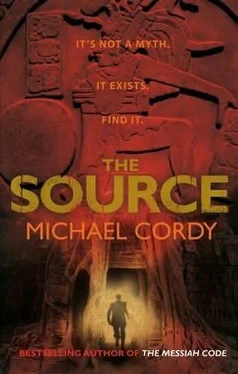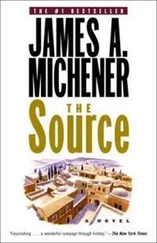Michael Cordy - The Source
Здесь есть возможность читать онлайн «Michael Cordy - The Source» весь текст электронной книги совершенно бесплатно (целиком полную версию без сокращений). В некоторых случаях можно слушать аудио, скачать через торрент в формате fb2 и присутствует краткое содержание. Жанр: Триллер, на английском языке. Описание произведения, (предисловие) а так же отзывы посетителей доступны на портале библиотеки ЛибКат.
- Название:The Source
- Автор:
- Жанр:
- Год:неизвестен
- ISBN:нет данных
- Рейтинг книги:5 / 5. Голосов: 1
-
Избранное:Добавить в избранное
- Отзывы:
-
Ваша оценка:
- 100
- 1
- 2
- 3
- 4
- 5
The Source: краткое содержание, описание и аннотация
Предлагаем к чтению аннотацию, описание, краткое содержание или предисловие (зависит от того, что написал сам автор книги «The Source»). Если вы не нашли необходимую информацию о книге — напишите в комментариях, мы постараемся отыскать её.
The Source — читать онлайн бесплатно полную книгу (весь текст) целиком
Ниже представлен текст книги, разбитый по страницам. Система сохранения места последней прочитанной страницы, позволяет с удобством читать онлайн бесплатно книгу «The Source», без необходимости каждый раз заново искать на чём Вы остановились. Поставьте закладку, и сможете в любой момент перейти на страницу, на которой закончили чтение.
Интервал:
Закладка:
'It goes back to the conquest of Peru by the Spanish, one of the most bizarre events in history. In 1532 Francisco Pizarro crossed the mountains from the coast, with fewer than two hundred men, and established himself in the great Inca plaza in Cajamarca. The Inca emperor, Atahualpa, with an unarmed retinue of thousands entered the plaza in good faith to meet the strange white men.
'Pizarro didn't meet Atahualpa, though. Instead he sent his chaplain, who approached the Inca and informed him that a certain God the Father had sent His Son, part of a Trinity, to Earth, where He was crucified. Before that happened, the chaplain explained, the Son, whose name was Jesus Christ, had conferred His power upon an Apostle, Peter, and Peter had passed that power, successively, to other men, called popes, one of whom had commissioned Charles the Fifth of Spain to conquer and convert the Inca and his people. Atahualpa's only hope of salvation, the chaplain concluded, was to swear allegiance to Jesus Christ and acknowledge himself a subject of Charles the Fifth.
'When he heard this, Atahualpa informed the chaplain that he, the Inca, was the greatest prince on earth and that he would be the subject of no man. This pope, he said, must be mad to talk of giving away countries that didn't belong to him. As for Jesus Christ who had died, the Inca was sorry, but – and here he pointed to the sun – "My God still lives in the heavens and looks down on His children." '
Ross smiled. He liked Atahualpa's style.
Zeb continued: 'The waiting conquistadors were hiding in the massive buildings that surrounded the square and, when the chaplain returned with the Inca's reply, Pizarro, his foot soldiers and cavalry erupted into the plaza. Muskets and cannons firing, they slaughtered between two thousand and ten thousand unarmed people that day and took the emperor prisoner.'
'All in the name of God and the Catholic Church, no doubt,' said Ross.
'No doubt. In captivity, Atahualpa spoke often with the Spanish and soon understood that, despite all talk of popes and Trinities, it was love of gold that brought the white men to his country. To gain his freedom he offered Pizarro enough gold – tears of the sun, as the Inca called it – to fill a room measuring seventeen by twenty-two feet to a height of nine feet. Soon afterwards Atahualpa was executed, but the king's ransom was paid and the chamber where it was measured, El Cuarto del Rescate, was said to be the one in which the Inca king was imprisoned – La Prision del Rey.'
Ross thumbed through his Lonely Planet guidebook and there, on page 336, was the major tourist attraction in Cajamarca, the only Inca building left standing in the town – El Cuarto del Rescate.
Just then, the captain announced that the plane was starting its descent and, out of the window, Ross saw Cajamarca sitting high on the slopes of the eastern Andes, above the clouds and surrounded by forest. Beyond, in the far distance, he glimpsed what looked like the shore of a great green ocean: the Amazon.
As he dreamt of what he might find in its midst, he didn't notice a man staring at him from five rows back.
25
Rome The Vatican's Sala Clementina was a tall room with a marble floor, the upper walls and high ceiling decorated with a fresco that seemed to stretch to Heaven itself. The Congregation for the Causation of Saints often used it to plead the case for their candidates. Today only three men occupied the large space: the three so-called popes, the most powerful men in Rome.
On the left, resplendent in the scarlet robes of his office, sat Cardinal Prefect Guido Vasari, the Red Pope. Tall and lean with a hooked nose and dark, hangdog eyes, he was head of the Congregation for the Doctrine of the Faith, the oldest and most powerful of the nine congregations in the Curia. Originally called the Inquisition, and tasked with ruthlessly protecting the Holy Mother Church from heresy, its role had evolved to promoting and safeguarding Catholic doctrine throughout the world. Many, however, still referred to the Cardinal Prefect by his original title: the Grand Inquisitor.
On the right, in sober black robes, sat Father General Leonardo Torino, the Black Pope, the Superior General of the Society of Jesus, the order founded by Ignatius Loyola and famed for its intellectual rigour and asceticism. Centuries ago, during the Counter-reformation, when the Inquisition had employed fear and torture to stem the flow of Protestantism, the Society of Jesus had favoured intellect and argument. Jesuits prided themselves on understanding the beliefs, customs and languages of potential converts better than they did themselves. This included the newest religion of all: science.
A stout, white-robed man sat at the head of the table, between Vasari and Torino: the pontiff.
Torino glanced at the other two and felt a surge of sympathy for Orlando Falcon. He imagined his brother Jesuit standing before these old men's predecessors, and his predecessor, trying to tell them what he had discovered. It must have been impossible. The Lord's emissaries on earth should be visionaries, not cautious old men who saw only obstacles. Torino rested his hands on the laptop and box file in front of him, hoping he had enough evidence to convince them to do what was necessary to reverse the Holy Mother Church's declining fortunes.
The Holy Father's watery blue eyes settled on his. 'You requested this meeting, Father General. Why?'
Torino opened his file and placed the pages on Father Orlando's trial and testimony before them. 'Four hundred and fifty years ago, our predecessors condemned a respected Jesuit priest to be burnt at the stake. His crime? He claimed to have discovered a garden of miracles for the Holy Mother Church.' He proceeded to summarize Falcon's trial and testimony.
'I don't understand, Father General,' said the pope, when Torino had finished. 'Since you became head of the Institute of Miracles you've been merciless with every claim. You're constantly telling me that although the Church needs miracles to show God's hand in the world, they must be scientifically proven examples that no one can deny. During your time in office you haven't ratified one miracle. Why are you interested in this priest's ancient claims?'
'Because I don't believe the Holy Mother Church should be forced, like a dog scrabbling for food, to seek out miracles. Instead she should be their inspiration, the wellspring from which they flow.' Torino held up a printout of Lauren Kelly's translation of the Voynich. 'This is a Yale academic's translation of the so-called Voynich Cipher Manuscript.'
'The Voynich?'
'The document that Father Orlando Falcon wrote while imprisoned by the Inquisition more than four centuries ago. The same Devil's book that the Church, especially the three men who held our positions at the time, denounced as the dangerous ramblings of a possessed man. The translation is almost identical to Falcon's original testimony recorded in the Inquisition Archives. It would appear that the text he wrote all those centuries ago was a coded language that has only now been understood. Why would Father Orlando have bothered to invent a complex language if his story was a lie, a heresy?'
'You walk in dangerous territory, Father General,' counselled the pope.
'Now is not the time to tread carefully, Your Holiness. Now is the time to be bold. If this miraculous Garden of God exists it has massive implications for the Church.'
'But it can't exist,' Cardinal Prefect Vasari said, reaching for Falcon's testimony. 'Father Orlando claimed, essentially, to have discovered the Garden of Eden in a primitive jungle, in the midst of savages. Eden can't have been in the New World among heathens. And his strange creatures and bizarre plants are far removed from any description in the Bible. He tried to rewrite Genesis, for heaven's sake.'
Читать дальшеИнтервал:
Закладка:
Похожие книги на «The Source»
Представляем Вашему вниманию похожие книги на «The Source» списком для выбора. Мы отобрали схожую по названию и смыслу литературу в надежде предоставить читателям больше вариантов отыскать новые, интересные, ещё непрочитанные произведения.
Обсуждение, отзывы о книге «The Source» и просто собственные мнения читателей. Оставьте ваши комментарии, напишите, что Вы думаете о произведении, его смысле или главных героях. Укажите что конкретно понравилось, а что нет, и почему Вы так считаете.





![Джеймс Купер - Пионеры, или У истоков Саскуиханны [The Pioneers, or The sources of the Susquehannah]](/books/395797/dzhejms-kuper-pionery-ili-u-istokov-saskuihanny-t-thumb.webp)






